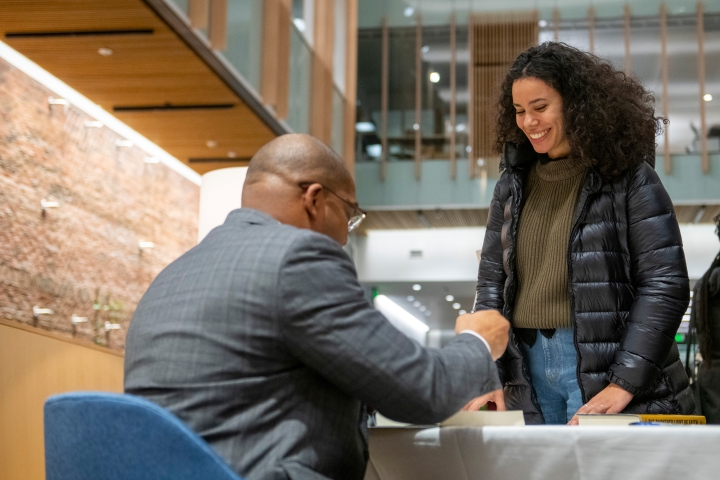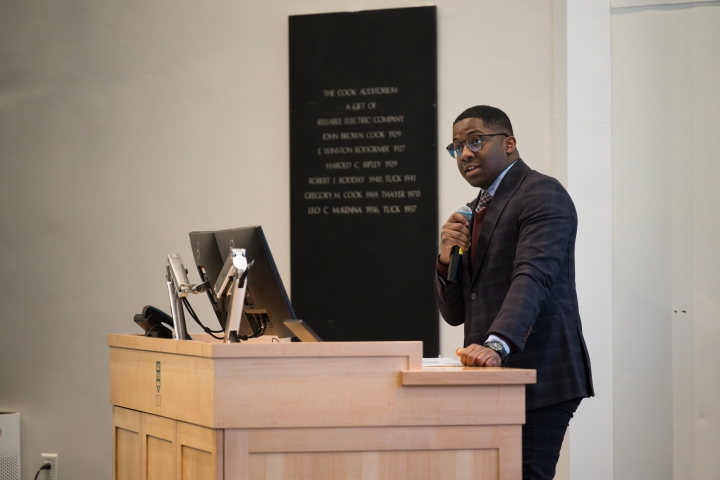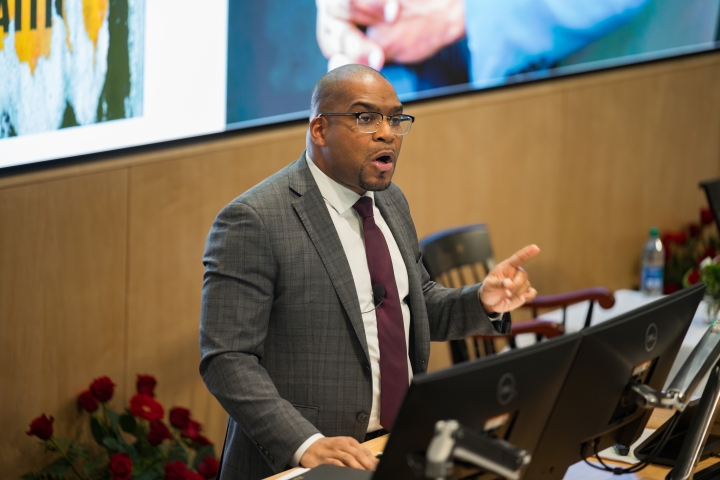“What is it about democracy that justifies our faith, especially African Americans’ faith, in it?”
That’s the question Melvin Rogers, a professor of political science at Brown University, asks in the introduction to his recent book, The Darkened Light of Faith: Race, Democracy, and Freedom in African American Political Thought.
Rogers offered thought-provoking answers Monday night in his keynote address in Cook Auditorium, part of Dartmouth’s monthlong celebration of the life and legacy of the Rev. Martin Luther King Jr. This year’s theme is Advancing Democracy Through Dialogue.
Drawing from the conclusion of his book, Rogers examined how novelist, playwright, and essayist James Baldwin attempted to re-shape misguided attitudes towards race relations in America.
“His writings captured the public imagination and shamed the political establishment as the Black freedom struggle was coming clearly into view in the early 1960s. And I turned to Baldwin because in him we find an attenuated aspirational politics born as it was from seeing both the promises and the betrayals of the United States,” Rogers said.
In his seminal 1964 essay, “The White Problem,” Baldwin expresses views on the origins and persistence of racial inequality that contrast sharply with those of his contemporaries, many of whom painted a more idealistic portrait of an America trying to break away from its shameful past, even as violence was building.
“It is worth recounting some of the notable events—the crisis of integration most visibly on display at the University of Mississippi and the ensuing white mob violence in 1962, the Birmingham Children’s Crusade March in May of 1963, the Birmingham Riot in May 1963, the assassination of civil rights activist Medgar Evers in June 1963, the March on Washington in August of 1963, the horrible 16th Street Baptist Church bombing in September 1963, the assassination of President John F. Kennedy in November 1963,” Rogers said.
“The political climate was intense, but behind it all were past debts coming due and a nation in denial.”
This state of denial, still deeply embedded in American society, need not last forever, said Rogers. “Baldwin’s plea is that Americans assume a different attitude, critically embrace their past, and allow both to structure a collective vision of responsibility.”

In attendance at the event were students, faculty, President Sian Leah Beilock, and community members.
Following Rogers’ lecture, Chloe Poston, vice president for culture, belonging, and strategic engagement, called for a moment of silence to mark the recent passing of King’s youngest son, Dexter.
She also issued a challenge.
“Professor Rogers’ lecture reminds us that Dr. King’s legacy is one brought forth by a multitude of scholars before, during, and after his rise to leadership and untimely death. We are all charged to consider how we might go forward and be critically engaged in the history of our country and our institutions as we reflect upon our responsibilities to one another and our democracy,” Poston said.
“I ask each of you to consider the key question Dr. Rogers brought forth. What will each of you do about it?”
Anthony Fosu ’24, president of the Dartmouth chapter of the NAACP, offered one answer, as he reflected on Rogers’ remarks after the formal program ended.

“He said that democracy lives in us…and the tension that he was describing, it lives in all of us. We have to resolve to do something, and for me, that something is to vote and to educate and be educated.”
For Senior Vice President and Senior Diversity Officer Shontay Delalue, Rogers’ speech was a reminder that “it is possible for people to have multiple experiences. What I heard him say was, be critically responsive to our past. Responsibility is not blame; it’s a shared awareness.”
The Martin Luther King Jr. commemoration continues at 5 p.m. on Thursday, Jan. 25, with a multifaith service in Rollins Chapel; at 7 p.m. on Saturday, Jan. 27, with the screening of Rustin at Loew Auditorium in the Black Family Art Visual Art Center; and at 5 p.m. on Tuesday, Jan. 30, with “Hip Hop at 50” in Dartmouth Hall 105.
